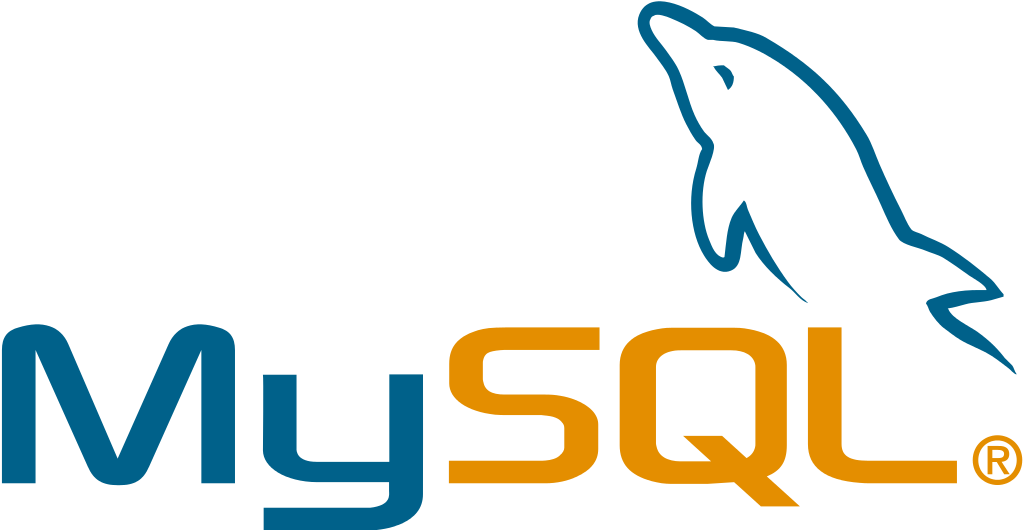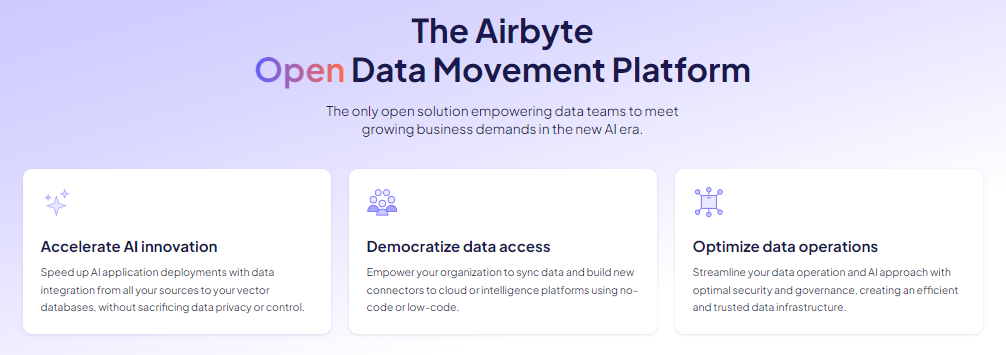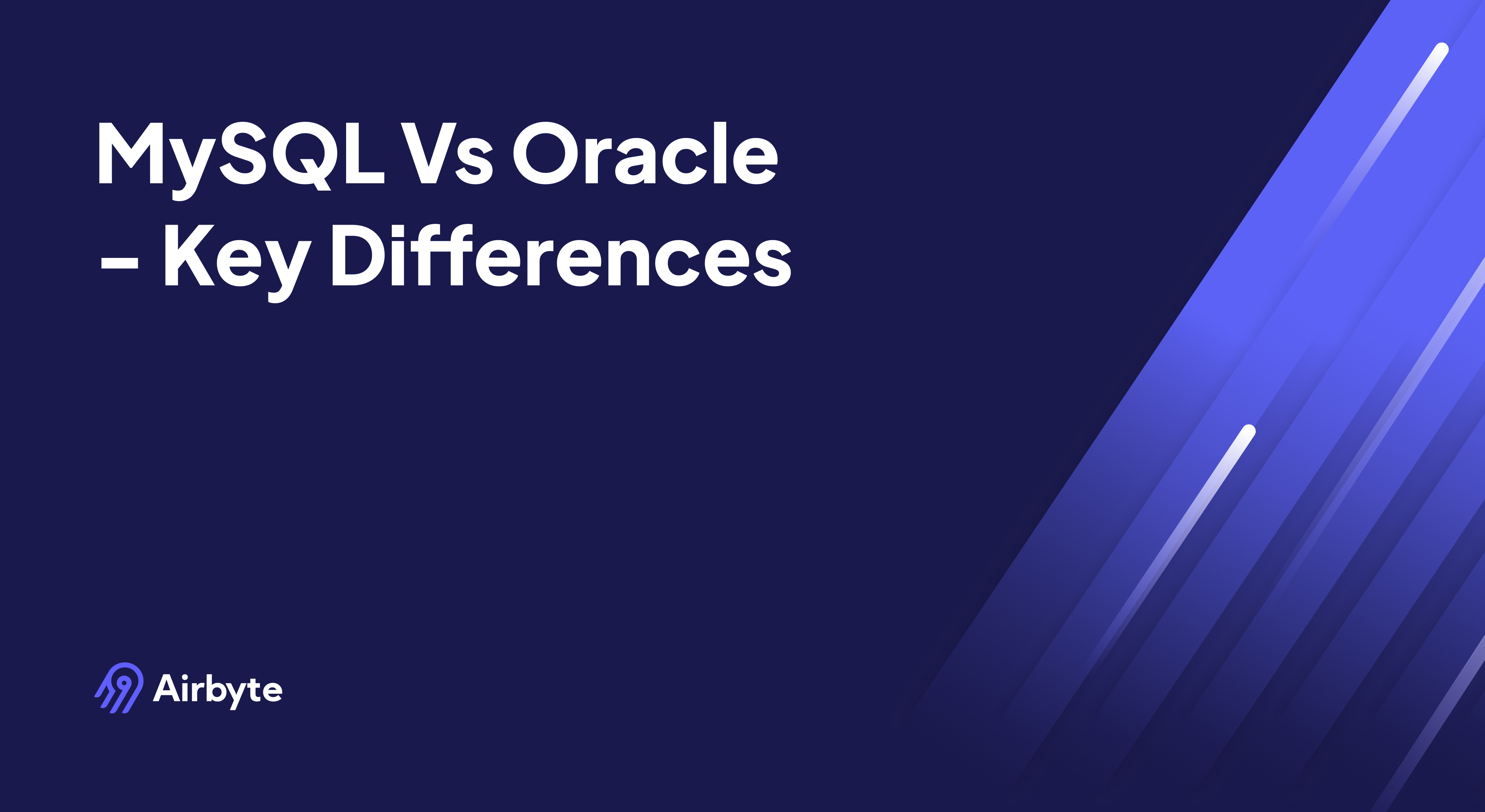MySQL Vs Oracle - Key Differences
Summarize this article with:
✨ AI Generated Summary
Choosing between MySQL and Oracle Database is a critical decision when selecting a relational database management system. While both are industry-leading solutions, they serve distinctly different needs.
MySQL is a lightweight, open-source database known for its simplicity and cost-effectiveness—making it ideal for startups, web applications, and developers seeking performance without premium pricing.
Oracle Database is an enterprise powerhouse built for organizations requiring maximum scalability, advanced security, and robust support for mission-critical applications. Its premium features come with a premium price tag.
In this guide, we'll compare MySQL vs Oracle across architecture, performance, pricing, and use cases to help you determine which database best fits your requirements.
TL;DR: MySQL vs Oracle at a Glance
- MySQL is an open-source, cost-effective database ideal for web applications, startups, and cloud-native deployments, commanding 52.5% developer market share
- Oracle Database is an enterprise powerhouse designed for mission-critical applications requiring advanced security, autonomous management, and massive scalability
- Key differences span architecture, pricing (free MySQL Community vs $47,500+ per core for Oracle Enterprise), performance optimization, and security capabilities
- MySQL excels in read-heavy workloads and rapid development; Oracle dominates high-concurrency, complex transactional systems with 108,167+ TPS
- Modern platforms like Airbyte enable seamless data integration between both databases with 600+ pre-built connectors
What Makes MySQL and Oracle Different Database Solutions?
MySQL: Open-Source Flexibility and Accessibility

MySQL is an open-source relational database management system (RDBMS) and one of the most widely used databases worldwide. Originally created by MySQL AB in the mid-1990s, it was later acquired by Oracle in 2010. Its popularity among developers and small to medium-sized businesses stems from its simplicity, reliability, and performance. Being open-source, MySQL enables you to modify and distribute the software without restrictions, providing flexibility for custom development.
MySQL excels in web applications and microservices architectures where rapid deployment and cost-effectiveness are priorities. Its lightweight footprint makes it ideal for containerized environments and cloud-native applications. The database supports both traditional relational data and modern JSON document storage through its native JSON data type, enabling hybrid workloads within a single system.
Key Features of MySQL
- High Performance and Scalability: Designed to handle a large number of queries efficiently, MySQL works well under heavy traffic and scales from small websites to large enterprise applications. The InnoDB storage engine provides optimized performance for concurrent read-write operations.
- Reliable Transactions: Transaction-safe storage engines such as InnoDB ensure that ACID properties are followed, providing data consistency and reliability even during system failures.
- Cross-Platform Compatibility: MySQL runs on Linux, Windows, macOS, and more, enabling work in diverse environments. This flexibility supports hybrid cloud deployments and multi-platform development teams.
- Document Store Capabilities: MySQL's X DevAPI allows fluent CRUD operations on JSON documents alongside traditional SQL queries, supporting applications that require both relational and document-oriented data models.
Oracle Database: Enterprise-Grade Power and Innovation

The Oracle Database is a robust RDBMS developed by Oracle Corporation in 1979. Since its launch, it has become one of the most trusted database solutions for enterprise environments. It is a multi-model database that can handle online transaction processing (OLTP), data warehousing, and mixed workloads with exceptional performance and reliability.
Oracle Database dominates mission-critical applications where data integrity, complex transaction processing, and enterprise-grade security are non-negotiable. Its advanced features support global enterprises with stringent compliance requirements and high-volume transactional workloads that demand sub-second response times. Oracle Database Appliance X11-HA systems demonstrate remarkable scalability, achieving over 108,167 transactions per second with 128 CPU cores enabled.
Key Features of Oracle Database
- Automation and Self-Management: Oracle's Autonomous Database handles routine tasks such as patching, backups, and tuning automatically. This reduces administrative overhead while maintaining optimal performance through machine-learning algorithms.
- Advanced Analytics and Machine Learning: Built-in analytics and Oracle Machine Learning (OML) enable advanced data analysis and predictive modeling directly within the database.
- Advanced Security: Encryption, data masking, auditing, and fine-grained access control make Oracle suitable for highly regulated industries. Oracle Database 23ai introduces SQL Firewall technology that inspects all incoming database connections and SQL statements to prevent SQL injection attacks and address compromised account issues.
- Converged Database Architecture: Oracle 23ai introduces native JSON processing, blockchain tables, and vector search capabilities, supporting modern application requirements while maintaining traditional relational strengths.
How Do Oracle and MySQL Compare Across Key Features?
The main difference between MySQL and Oracle is that MySQL is an open-source relational database known for its ease of use and cost-effectiveness, while Oracle is a robust, enterprise-grade relational database offering advanced features, scalability, and comprehensive support.
What Factors Should Guide Your Choice Between Oracle and MySQL?
Scalability Requirements
MySQL supports vertical scaling through CPU and memory upgrades, with optimized buffer management allowing memory allocation up to 80% of system RAM. Horizontal scaling capabilities include read replicas for distributing read operations, application-level sharding for partitioning data across multiple servers, and MySQL Cluster (NDB) for auto-sharding with high availability features.
Oracle Real Application Clusters (RAC) enables multiple servers to function as a unified system with shared-disk clustering and cache fusion technology for ultra-low latency inter-node synchronization. RAC provides transparent scaling for both reads and writes across all workload types—including OLTP, analytics, AI vectors, and JSON processing. Automatic Storage Management (ASM) dynamically redistributes I/O loads and enables volume expansion up to 128TB per file.
Performance Optimization
Query caching stores results of frequently executed queries, dramatically reducing response times for repeated operations and making MySQL particularly effective for read-heavy workloads. MySQL HeatWave combines transactional and analytical processing in a single engine, accelerating complex queries up to 1100 times faster than traditional approaches.
Oracle's cost-based optimizer provides exceptional efficiency in query execution planning. The parallel query execution engine distributes complex operations across multiple CPU cores and cluster nodes, handling heavy write concurrency significantly more efficiently than MySQL in benchmark comparisons. Oracle's in-memory columnar processing bypasses traditional disk access for analytical workloads, delivering substantial performance improvements for complex analytical operations.
Security and Compliance
MySQL Enterprise Edition provides Transparent Data Encryption (TDE) that protects critical data through data-at-rest encryption, automatically encrypting physical database files in real-time. The platform supports integration with centralized key management solutions through OASIS KMIP protocol implementations, including Oracle Key Vault and other enterprise key management systems.
Oracle Database 23ai's SQL Firewall is built directly into the database kernel, ensuring protection cannot be bypassed regardless of SQL execution path. Database Vault provides comprehensive data security controls to restrict access to application data by privileged users, while Label Security provides row-level security using data sensitivity labels to control access with high granularity.
Cost Comparison and Total Ownership
MySQL's Community Edition provides free access to core database functionality, with MySQL Enterprise editions starting at $2,140 annually for 1-4 socket servers. Even the most expensive MySQL Cluster Carrier Grade Edition, at $10,700 for smaller servers and $21,400 for larger configurations, represents a fraction of Oracle's Enterprise Edition costs.
Oracle Database Enterprise Edition processor licenses cost approximately $47,500 per processor core, with Standard Edition 2 licenses priced at $17,500 per processor core. While licensing costs are substantial, Oracle's comprehensive feature set and enterprise support often justify the investment for mission-critical applications where database reliability and performance directly impact business revenue and customer satisfaction.
How Have Recent Updates Impacted Cloud-Native Application Suitability?
MySQL's Cloud-Native Evolution
MySQL 8.4 LTS establishes a foundation for enterprise deployments with its five-year Premier Support commitment and three additional years of Extended Support. The release continues with caching sha2 password as the default authentication method but disables mysql native password by default, demonstrating MySQL's proactive approach to security modernization. MySQL 9.2 introduces groundbreaking JavaScript integration capabilities through the JavaScript Transactional API, enabling developers to use modern JavaScript for transactional operations.
Oracle's Autonomous Database Innovations
Oracle Database 23ai introduces over 300 new features with concentrated focus on artificial intelligence integration and developer productivity enhancement. The AI Vector Search capability enables organizations to leverage advanced AI models for generating and storing vectors of documents, images, sound, and other unstructured data types. JSON Relational Duality enables developers to work with data using both relational and document paradigms interchangeably.
What Are the Emerging Data Integration Trends for Enterprise Environments?
AI-Driven Integration Automation
AI now automates data mapping, anomaly detection, and transformation logic. MySQL HeatWave AutoML integration enables model building, training, and deployment directly within MySQL, democratizing machine learning capabilities for organizations without specialized data science expertise. Oracle Database 23ai's comprehensive AI integration supports multiple embedding model options, including commercial services like openai.com and cohere.com, as well as open-source alternatives through Hugging Face Transformers.
Real-Time Event-Driven Architectures
MySQL's Change Data Capture (CDC) works with platforms like Kafka for real-time streaming. MySQL's Group Replication enables consistent data distribution across multiple nodes with eventual consistency guarantees, supporting global deployments with automatic failure detection and recovery. Oracle supports native event processing through Advanced Queuing and RAC, with Oracle RAC's cache fusion technology providing ultra-low latency inter-node synchronization for real-time applications.
Decentralized Data Governance Through Data Mesh
MySQL's open-source nature aligns with domain-oriented ownership, with MySQL's Community Edition providing free access to core functionality while supporting distributed governance models. Oracle enforces comprehensive governance with Database Vault and Label Security, providing sophisticated access control mechanisms that support centralized governance requirements while enabling distributed data operations.
How Can You Seamlessly Migrate Data Into MySQL or Oracle Using Airbyte?

Airbyte is an open-source data-integration platform with over 600 pre-built connectors that support both MySQL and Oracle.
Advanced MySQL Integration Capabilities
Airbyte's MySQL connector implements CDC via binary log processing and supports MySQL Document Store, preserving JSON structures during migrations. The platform supports MySQL's pluggable storage engine architecture, including InnoDB for transactional workloads and specialized configurations for analytical scenarios.
Oracle Database Enterprise Features
Airbyte's Oracle connector works with Real Application Clusters (RAC) and Autonomous Database, handling complex data types and maintaining enterprise security via encrypted connections and role-based access control. The connector supports Oracle's single, highly optimized storage engine with advanced compression, automatic partitioning, and intelligent storage management features.
Key Platform Advantages
- Developer-friendly pipelines with PyAirbyte
- Flexible deployment options (cloud, self-hosted, hybrid)
- Intelligent CDC capabilities for real-time sync
- Native orchestration integrations (Airflow, Kestra, Prefect, Dagster)
- Extensible Connector Development Kit for custom sources
Summary
When choosing between MySQL and Oracle Database, weigh scalability, performance, security, and cost against your organization's needs:
- MySQL is ideal for web applications, microservices, and cloud-native deployments that prioritize cost-effectiveness and rapid development. MySQL commands 52.5% of developer usage, demonstrating its dominance in the developer community and web application development scenarios.
- Oracle Database is built for mission-critical enterprise workloads requiring advanced security, autonomous management, and converged-data capabilities. Oracle maintains approximately 28% market share in the database software market, focusing on enterprise customers who require sophisticated database capabilities.
Modern integration platforms like Airbyte let you draw on the strengths of both databases while maintaining unified, governed data pipelines.
Frequently Asked Questions (FAQ)
Is MySQL or Oracle better for enterprise applications?
Oracle is generally preferred for mission-critical enterprise applications because of its advanced security, RAC clustering, and autonomous management. MySQL, while simpler and more cost-effective, is widely used in startups, SMBs, and web-focused environments.
Which database performs better: MySQL or Oracle?
Oracle typically outperforms MySQL in large-scale, high-concurrency workloads due to parallel query execution, RAC, and in-memory processing. MySQL offers excellent performance for web apps and read-heavy workloads, especially when combined with HeatWave for analytics acceleration.
Is MySQL easier to use than Oracle?
Yes. MySQL is known for its simplicity, quick setup, and large community resources, making it easier for developers and smaller teams. Oracle requires more expertise and administration but provides powerful automation through Autonomous Database.
How much does MySQL cost compared to Oracle?
MySQL Community Edition is free, while Enterprise Edition starts at a fraction of Oracle's licensing costs. Oracle Enterprise Edition can cost tens of thousands of dollars per processor core, making it significantly more expensive, but often justified for enterprises where downtime or data loss would be critical.
Suggested Reads:

.webp)
